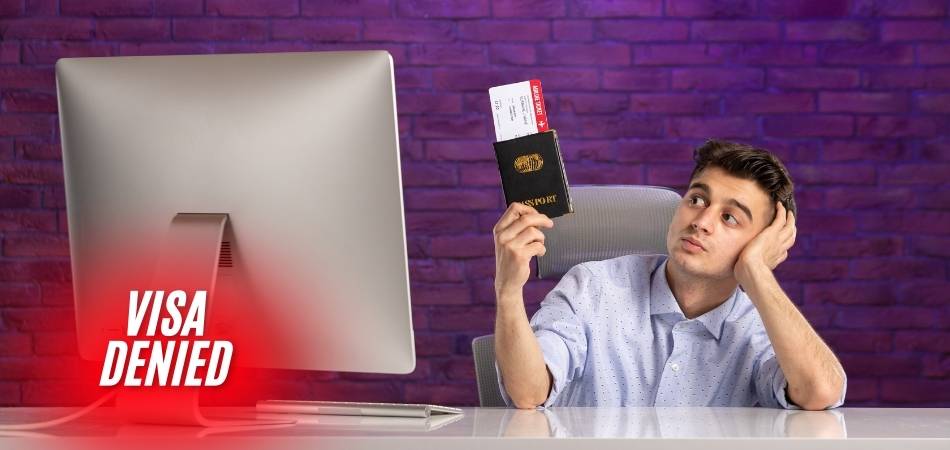You can expand your knowledge, network with industry leaders, and discover new business prospects by attending a conference in the US. Those who wish to attend the conference from outside the US must apply for a US conference visa. However, many applicants often wonder: Can a US conference visa be denied?
Yes, a US conference visa can be denied if the applicant fails to meet the necessary visa requirements or does not satisfy other eligibility criteria set by immigration authorities. Uncompleted documentation, weak ties to the home country, and financial insufficiency can all lead to rejection.
To ensure a smooth application process and increase your chances of approval, follow the rest of this article for valuable insights and practical tips.
Can a US Conference Visa Be Denied?
Yes, a US conference visa can be denied. Attending a conference in the U.S. offers valuable opportunities to expand knowledge and network. However, securing a visa requires careful preparation to meet the necessary criteria. Applicants must ensure they follow all guidelines to improve their chances of approval. The following are some common reasons for US conference visa denials:

Failure to Meet Visa Requirements
Not meeting visa requirements is a major reason for visa denial. Every applicant must provide accurate and complete documentation. Any missing or incorrect details can lead to rejection. Reviewing official guidelines before applying is highly recommended.
Insufficient Financial Proof
Applicants must demonstrate their financial ability to support their trip. Without strong proof of funds, the application may face rejection. Providing recent bank statements and sponsorship letters is crucial. Financial stability assures the authorities of a smooth stay.
Lack of Strong Ties to Home Country
A weak connection to the home country can raise concerns about overstaying. Authorities need proof that the applicant will return. Strong ties such as family, employment, or assets should be clearly shown. Demonstrating these factors increases approval chances.
Incomplete or Incorrect Documentation
Mistakes in paperwork can lead to delays or denials. Each document should align with the provided information. Even minor errors may result in rejection. Careful review of all forms before submission is essential.
Suspicious Travel History
A history of previous visa refusals or overstays can raise red flags. Immigration authorities assess past travel behavior closely. A clean record with valid reasons for previous travel is beneficial. Transparency in providing travel details is important.
Weak Conference Purpose Explanation
A vague explanation of the conference’s purpose can lead to rejection. Clear details, such as event invitations, should be provided. Attending upcoming conferences in USA requires strong justification. A well-defined travel purpose helps build trust with officials.
Security Concerns
Background checks are a standard part of the visa process. Any criminal records or security threats can result in denial. Providing honest and accurate information is extremely important. Applicants should disclose any past incidents truthfully.
Inconsistent Interview Responses
Visa interviews play a vital role in the approval process. Inconsistent answers can create doubts. Applicants should prepare by reviewing their application details. Staying honest and confident during the interview is key.
How Can Applicants Ensure They Meet All US Conference Visa Requirements?
Applying for a US conference visa requires careful planning and attention to detail. Application applicants can avoid errors and delays by being aware of the requirements. Proper preparation increases the chances of a successful visa approval. Below is a detailed explanation:
Gather All Necessary Documents
Applicants should collect every required document well in advance. Each document must be accurate and relevant to the application. Having an organized file speeds up the process. Keeping copies of all paperwork ensures readiness for any follow-up requests.
Verify Application Details
Checking the application for accuracy helps prevent errors. Small mistakes can cause unnecessary delays or rejections. Double-checking names, dates, and contact details is important. Submitting error-free applications demonstrates attention to detail.
Show a Clear Travel Itinerary
A well-prepared itinerary outlines the entire trip. Including travel dates, hotel bookings, and event schedules is helpful. Providing a clear plan reassures officials about the applicant’s intentions. A detailed itinerary also shows proper organization.
Obtain a Strong Letter of Invitation
An official invitation letter strengthens the visa application. The letter should come from the conference organizers. It must include event details and the applicant’s role. A detailed letter adds credibility to the application.
Prepare for the Visa Interview
Confidence during the visa interview improves approval chances. Applicants should practice common questions beforehand. Providing honest and concise answers builds trust with the interviewer. Staying calm and professional creates a positive impression.
Seek Professional Guidance
Consulting with visa experts can provide valuable insights. Professionals can guide applicants through complex procedures. Their advice helps avoid common mistakes. Proper guidance increases the likelihood of visa approval.
Is It Possible to Reapply After Being Denied a Conference Visa?
Yes, it is possible to reapply after being denied a conference visa. Applicants should start by understanding why their application was rejected. Addressing these concerns carefully can improve the chances of success in the next attempt.
Before submitting a new application, you should fix any errors in the previous one. Submitting updated and accurate documents is essential when reapplying after a US conference visa rejection, as it demonstrates attention to detail. Providing strong evidence to resolve earlier concerns significantly strengthens the overall application.
Applicants must also demonstrate significant improvements in their circumstances. Highlighting changes that address previous issues builds confidence in the new application. This ensures a more positive evaluation by immigration officials.
Seeking guidance from visa experts can make the reapplication process smoother. Professionals provide individual advice to meet specific visa requirements. Their expertise can help applicants avoid common mistakes and improve approval chances.
Common Documentation Mistakes That Can Lead to Visa Denial
Applying for a visa requires thorough preparation and accurate documentation. Small mistakes in paperwork can result in unnecessary delays or denials. Being aware of these common errors helps applicants avoid setbacks and improve their chances of approval.
- Incomplete Application Forms: Missing sections or unanswered questions in the visa form can lead to rejection. Ensure all fields are accurately and completely filled.
- Inconsistent Information: Providing inconsistent details across documents raises red flags. Double-check that names, addresses, and dates are consistent throughout all paperwork.
- Outdated Financial Statements: Submitting old or irrelevant financial documents weakens the application. Always provide recent bank statements to prove financial stability.
- Incorrect Supporting Documents: Attaching irrelevant or wrong documents confuses the reviewers. Verify all documents match the visa requirements before submission.
- Errors in Personal Details: Spelling errors in names or incorrect dates of birth can cause delays. Ensure personal details are correctly entered in every form.
- Lack of Invitation Letter: Failing to include an official invitation letter impacts credibility. Always submit a properly detailed and signed invitation from the organizers.
- Unverified Employment Records: Providing unverified or vague employment details creates doubts. Include clear proof of employment with contact information for verification.
- Missing Proof of Ties to Home Country: Not demonstrating strong ties to the home country raises concerns about intent. Include family, property, or job-related documents to show connections.
- Improperly Translated Documents: Non-English documents without certified translations may lead to rejection. Ensure all foreign documents are accurately translated and notarized if required.
- Expired Passport: Submitting an expired or soon-to-expire passport invalidates the application. Confirm your passport’s validity covers the required travel duration.
Should Applicants Disclose All Past Incidents, Even if They Seem Irrelevant?
Yes, applicants should disclose all past incidents, even if they appear irrelevant. Immigration authorities conduct thorough background checks for every applicant. Omitting details, no matter how minor, may lead to trust issues and possible visa denial.
Being honest about previous incidents demonstrates integrity and transparency. Even if past issues were resolved, withholding them can raise suspicions. For example, not disclosing the consequences of overstaying US conference visa can be serious repercussions.
Clear and truthful communication helps build credibility with immigration officials. Providing explanations for past incidents can address any concerns effectively. Full disclosure reduces the risk of misunderstandings and increases the chances of visa approval.
When to Take Professional Help for Your US Conference Visa Application?
Applying for a US conference visa can be a complex process. While some applicants can manage it on their own, others may need professional help. Knowing when to seek expert assistance can save time, reduce stress, and improve your chances of approval.
Clear Guidance on Requirements
If you’re unclear about the necessary documents, professional help can guide you. Experts provide you with a checklist for your specific situation. They ensure that all required forms and documents are correctly filled out. This step reduces the risk of missing crucial paperwork.
Addressing Complicated Travel History
A complicated travel history, such as visa denials or overstays, can make the process challenging. Professionals know how to address these issues effectively in the application. They offer solutions that improve your chances of approval. Their expertise helps avoid mistakes that could harm your case.
Time-Sensitive Applications
If your application deadline is approaching, professional help can speed up the process. Experts are familiar with the visa process and can handle paperwork efficiently. They know how to organize documents and submit them quickly. Their experience ensures you don’t miss any important steps.
After a Visa Denial
If your visa application was denied, professional assistance can make a significant difference. They can identify the reasons for the rejection and correct them. With expert guidance, you can avoid making the same mistakes. Reapplying with professional help increases the chances of success.
Preparing for the Interview
If you’re nervous about the visa interview, professionals can help you prepare. They provide guidance on common questions and how to respond. Practicing with an expert helps you remain confident during the interview. This preparation can lead to a more successful outcome.
Strengthening Your Application
A well-prepared application increases the chances of visa approval. Professionals review your documents for accuracy and completeness. They help you present the strongest case to the visa officers. Their assistance ensures that your application stands out in the best possible way.
Answers to Some Common Questions
Managing the US conference visa application process can be challenging. To help you better understand potential pitfalls and how to avoid them, here are some frequently asked questions with detailed answers.
Can I Attend a Conference Without a US Visa?
No, if you are traveling from outside the United States, you need a valid visa to attend a conference. The US conference visa grants legal permission to participate in events, ensuring compliance with immigration laws.
How Long Does It Take to Process a US Conference Visa Application?
Processing times vary depending on the embassy or consulate, but typically, it can take anywhere from a few weeks to a couple of months. It’s advisable to apply well in advance of the conference dates to avoid delays.
Is It Possible to Deny US Conference Visa Due to Previous Employment History?
Yes, if your previous employment history shows gaps or inconsistencies, it could raise concerns about your intentions. Immigration authorities may question whether you have strong ties to your home country and may deny the visa based on that.
Do I Need Travel Insurance for My US Conference Visa?
While travel insurance is not a requirement for the visa application itself, it is highly recommended. Travel insurance provides coverage for unexpected events, such as cancellations or medical emergencies, ensuring peace of mind during your trip.
Can I Attend Multiple Conferences on One US Conference Visa?
A US conference visa typically allows you to attend one event at a time. If you plan to attend multiple conferences, you should clarify this in your application. Additional information and invitation letters may be required.
Final Thoughts
There are many benefits to attending a US conference, but obtaining a visa requires careful preparation. However, can a US conference visa be denied? Yes, it can be if applicants fail to meet essential requirements, such as incomplete documentation, weak ties to their home country, or insufficient financial proof.
To improve chances of approval, applicants should ensure they provide accurate and complete information, demonstrate financial stability, and explain the purpose of their trip clearly. Moreover, seeking professional help can guide applicants through the complex process, especially in cases of complicated travel history or previous denials. Proper planning and attention to detail are key to a successful visa application.






